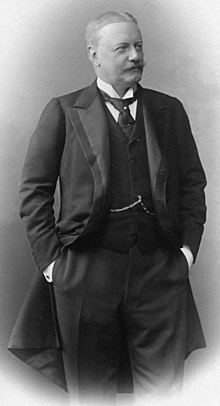Bernhard von Bülow
Bernhard Heinrich Karl Martin von Bülow (3 May 1849 – 28 October 1929), created Prince (Fürst) von Bülow in 1905, was a German statesman who served as Secretary of State for Foreign Affairs for three years and then as Chancellor of the German Empire from 1900 to 1909.
Bülow spoke several languages, was a charming conversationalist and was comfortably at home in high society with a capacity to entertain and impress even his opponents. He was thought by some colleagues to be untrustworthy: Kiderlen referred to him as "the Eel", as did Tirpitz. Once he obtained power and position in the German government, had no overarching ideas of what to do with them, allowing others to guide policy. His character made him a good choice to work with Emperor Wilhelm II, who required agreement and flattery from his senior ministers even if sometimes they then ignored his instructions. He wrote four volumes of autobiography to be published after his death, which markedly altered public perception of his character as they included his candid and malicious descriptions of others. He was a fine debater in the Reichstag, although generally lazy in carrying out his duties. He was described by Friedrich von Holstein, who was for 30 years the first councillor in the foreign department and a major influence on policy throughout that time, as having "read more Machiavelli than he could digest". His mother-in-law claimed that "Bernhard makes a secret out of everything."
Bernhard Heinrich Karl Martin von Bülow was born at Klein-Flottbeck, Holstein (now part of Altona, a part of Hamburg). His father, Bernhard Ernst von Bülow, was a Danish and German statesman. His brother, Major-General Karl Ulrich von Bülow, was a cavalry commander during World War I who took part in the attack on Liège in August 1914. Bülow attributed his grasp of English and French to having learnt it from French and English governesses as a young child. His father spoke French, while his mother spoke English, as was common in Hamburg society.
...
Wikipedia

